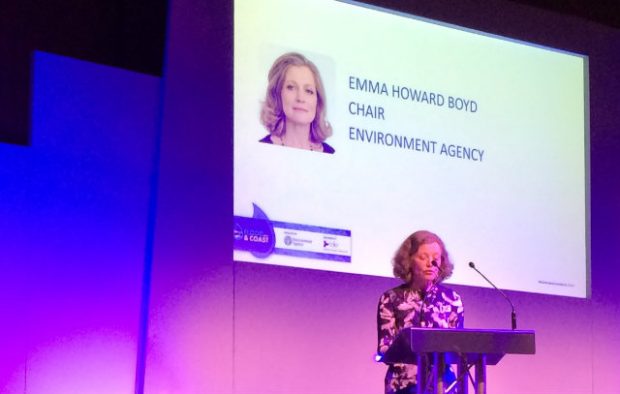 Flood and coastal risk management is an area where people naturally look to the Environment Agency for leadership. After all, we hold the strategic overview of flood and coastal risk management, and with colleagues across the Defra Group we have a wealth of experience and expertise. However, we can only achieve our aims, and much more, by bringing people together. I place huge importance on our relationships - without them we cannot do what we do. And when we act together, I believe there is almost nothing we cannot achieve.
Flood and coastal risk management is an area where people naturally look to the Environment Agency for leadership. After all, we hold the strategic overview of flood and coastal risk management, and with colleagues across the Defra Group we have a wealth of experience and expertise. However, we can only achieve our aims, and much more, by bringing people together. I place huge importance on our relationships - without them we cannot do what we do. And when we act together, I believe there is almost nothing we cannot achieve.
With this in mind, I am hugely excited to be part of our Flood and Coast Conference 2017 this week, which brings together experts from across the flood and coastal risk management world. Together, we will look at how we can create a future where people and the environment can be more resilient, resistant and responsive to flooding and coastal erosion
I saw leadership at all levels during the surge along the east coast of England in January. High tides combined with strong winds brought a real risk of significant flooding and danger to life. Thankfully, on this occasion the surge did not materialise - but it could have been devastating.
During the event, 550,000 properties were protected, preventing an estimated £37 billion of economic damage to the UK. When I visited our teams at the Hull Barrier and South Ferriby to see our preparations in action, I was struck by the professionalism, commitment and heart not just of our own staff but also of our partners, who do so much to keep the people and places we serve safe.
All those involved, with their many separate roles, must work together before, during and after these events. Lead local flood authorities and district councils play a vital role, supporting flood action groups and acting as the glue holding people together. The flood action groups in turn play an essential role in the local community. They represent the true meaning of local leadership, rallying round to help those in need, bringing communities together to help one another and support those who lose homes or property. We work closely with them all by sharing our data, information and intelligence; and by listening and acting on the insight they provide.
Regional Flood and Coastal Committees play an important leadership role, too, providing valuable guidance and wise council. They help us and our partners better understand local issues and to balance priorities. I continue to benefit personally from the regular advice I receive from their Chairs.
Of course, there are many others who show leadership in other ways, helping to reduce flood risk. Over the past 7 years, water and sewerage companies have embraced their risk management authority roles. Landowners and farmers are embracing opportunities to better work with nature to manage flood risk, and balance the needs of agriculture with the need to protect communities from flooding. Developers are innovating through the construction of beautiful, resilient places and buildings, such as BRE’s flood house at its innovation park - an inspired project demonstrating just what can be done.
And I am no doubt that it is more cost-effective to make properties more resilient rather than pay to repair the damage following a flood. Individual householders have their own role to play here, as I have talked about before.
So, as the Flood and Coast Conference 2017 brings together key leaders, we will share our knowledge. We will learn, discuss, reflect and innovate, taking us a step closer on our journey towards building a nation better protected against flooding. This is a destination we want to reach together, and will need strong leadership to get us there.
(You can keep up with what we’re discussing on our Twitter feed #FloodandCoast2017).

Leave a comment